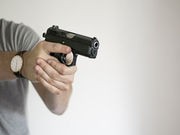

Almost two-thirds of violent gun crime arrests among the mentally ill were people who were already legally prohibited from having a firearm, a new study from Florida reveals.
And close to one-third of the suicides carried out by the mentally ill were among people who weren’t legally allowed to possess a firearm, the study found.
“That’s a failure of the enforcement mechanism,” said study lead author Jeffrey Swanson.
That troubling finding reflects a problem with the criteria for identifying individuals at risk, added Swanson, a professor with Duke University School of Medicine’s department of psychiatry and behavioral sciences.
Mental illness causes only a small fraction of gun violence in the United States, around 3 to 5 percent, said Colleen Barry, a professor at Johns Hopkins Bloomberg School of Public Health in Baltimore.
The Duke study “does bring new evidence to this thorny policy area,” said Barry. She is a co-director of Hopkins’ Center for Mental Health and Addiction Policy Research.
“When we think about mental illness and gun policy, we should be focusing laser-like on the suicide component, because this is where we really have a much higher risk of mortality than we do in the context of homicides,” she said.
Swanson and his team pulled records on 82,000 adults with schizophrenia, bipolar disorder or major depressive disorder. All were receiving services in the public behavioral health care system in Florida’s Miami-Dade and Pinellas counties beginning in 2002.
The researchers collected information on violent gun-crime arrests, gun suicides, hospitalizations, incarcerations, court adjudications and cause of death, among other sources, to create a database covering a 10-year period. Comparison groups were created to examine key outcomes.
Although limited to a specific population in a single state, the study authors believe the findings can help inform state and federal efforts to make existing criteria for restricting gun access more precise.
For example, the study found that of the 50 people who used a firearm to take their own lives, 72 percent were legally able to buy a gun on the day they died.
Some suicides and violent gun-related crimes, for example, might be prevented if more states stopped people who’ve been involuntarily held for evaluation during a mental health crisis — but not involuntarily committed to a mental hospital — from buying guns, the findings suggested.
In the study, 26 percent of people who retained their gun rights had a history of a this type of short-term hold.
Florida closed that loophole after the study period ended. About half of the states strip gun rights from people on those temporary, short-term holds, but half do not, Swanson said.
Longer-term efforts to deter gun violence must also focus on prevention, Swanson said.
Violent behavior is caused by “a whole cocktail of factors that come together and interact in complicated ways,” Swanson said. “If you want to think about solving the violence problem, it’s way too simplistic to say let’s improve the mental health system,” he said.
“Think about violence as if it were a communicable disease,” he continued. Part of the solution is to build healthier communities with improved access to substance abuse treatment, better economic opportunities and fewer kids exposed to trauma who grow up to be perpetrators, he said.
The report was published in the June issue of Health Affairs.
More information
The National Alliance on Mental Illness has more on mental illness and gun reporting laws.
Source: HealthDay
Copyright © 2025 HealthDay. All rights reserved.

Leave a Reply